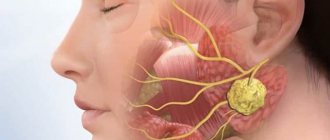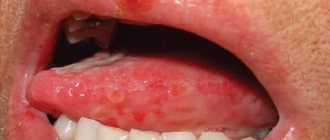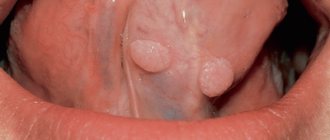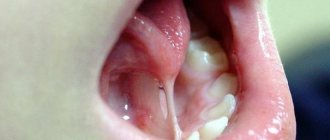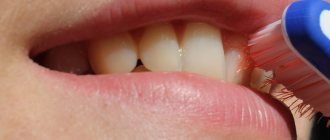Reasons for the appearance of a lump
A tumor can appear for various reasons. If the pain is not severe, temporary, and goes away on its own within a day, there is nothing to worry about. And when the appearance of a growth causes significant discomfort and lasts for several days, you should be alarmed. A growth under the tongue near the frenulum can be caused by the following factors:
- Condylomatosis, that is, papilloma virus. In this situation, the cell growth mechanism is disrupted. The early phases of the disease have no obvious symptoms. The virus is actively transmitted through household and sexual contact, especially with weak immunity. The nature of warts is such that they act selectively. HPV is distinguished by genotypes. There are benign and life-threatening strains. Warts may rise above the muscular organ. Keratin, which is produced in such cells, gives the balls rigidity.
- Inflammation often appears when the frenulum is short from birth. It is better to correct the problem in childhood.
- The process of inflammation appears with vitamin deficiency, gastrointestinal diseases, allergies, abscesses in the oral cavity, and injuries.
- A pimple on the frenulum under the tongue is formed during tonsillitis, when streptococci and staphylococci are activated and the lymph nodes are affected.
- The problem occurs when the salivary duct is blocked. Mineral or mucus plugs can become an obstacle. This interferes with patency. In this situation, a ranula is formed, which contains liquid exudate. The bubble may be clear or cloudy. It can burst, then build up again. Provoking factors include stomatitis, herpes, candidiasis, and lichen planus.
Since the mucous tissues of the oral cavity are sensitive, they can be damaged by hot food or drink. In the burn area, bacterial microflora feels comfortable, which contributes to the formation of salivary plugs in the ducts.
How to spot early symptoms of tongue cancer
20.06.18
The fear of getting cancer is quite common and is called cancerophobia, or less commonly, cancrophobia. I would say, given the inclusion of cancer in the top five most common causes of death, that this fear is quite constructive if it prompts you to avoid risk factors and be regularly examined by an oncologist. This is good form - modern and responsible.
Tongue cancer is less common than many other types of cancer, but the fear of it is great due to the expected disability and significant impairment of quality of life.
What needs to be done to catch it at an early stage, at which it is possible to do without crippling methods of treatment?
Tongue cancer is insidious - its early manifestations are masked by harmless symptoms and require an active search even with regular examination. The greatest likelihood of detecting the first symptoms occurs during a regular dentist appointment. Firstly, he knows well what a healthy tongue should look like, and secondly, he knows what to do if he suspects the onset of a disease. It is important to understand that the dentist will notice early symptoms if you ask about it at the appointment, present complaints or concerns. If dangerous symptoms are detected, the dentist is obliged to refer the patient to an oncologist.
Particular attention to the tongue and oral cavity should be given to smokers, people working with carcinogens - asbestos, perchlorethylene, petroleum products and heavy metal salts. The second place among the risk factors for developing tongue cancer is microtrauma from sharp edges of teeth, poorly fitting dentures and fillings. The so-called precancerous diseases and conditions are important - erosion of the tongue, leukoplakia, papillomas, hyperkeratic and ulcerative-erosive forms of systemic lupus erythematosus and lichen planus, Bowen's disease.
Men suffer from tongue cancer 6-7 times more often than women. The reasons for this are poorly understood, it is assumed that they are more likely to be exposed to harmful factors, but it is possible that cancer is inherited on the Y chromosome.
Most often the lateral surface of the tongue is affected, less often the root or bottom of the tongue, and least often the surface. The tip of the tongue accounts for only 3% of identified cases. To identify tongue cancer at an early stage, let’s remember its three main manifestations:
- the presence of papillary growths or whitish spots, compactions or redness on the tongue, special attention to the lateral surfaces!
- enlargement of the submandibular lymph nodes
- soreness in the tongue without clear localization. This symptom is rare, more often it is simply a feeling of discomfort, an unusual sensation in the tongue.
At this stage, the oncologist will do a smear test or biopsy to identify the type of cancer or rule it out. By the way, for the initiated, in 95% of histologically, tongue cancer is classified as squamous, i.e. develops rapidly and metastasizes quickly.
At the second stage, it is called “developed”, the symptoms are more distinct, but the treatment prognosis is worse.
- the pain becomes more localized, radiating to the ear, temple or oral organs
- salivation increases
- there will be a bad breath
- There is numbness in parts of the tongue, difficulty pronouncing sounds, pain when swallowing
- with the papillary form, a distinct growth will appear on the tongue (see illustration), with the ulcerative form, a growing ulcer with a distinct ridge along the edges (also shown in the illustration)
- in the infiltrative-ulcerative form, deep fissure ulcers appear on the tongue; in the infiltrative form, the body of the tongue thickens
The advanced stage is quite obvious and we will not consider it within the scope of this material.
Treatment for tongue cancer is always complex, including surgery, radiation therapy and chemotherapy. Prevention consists of quitting smoking, limiting alcoholic beverages, and regular dental and oral care.
Timely diagnosis allows for a favorable survival prognosis, which some authors note at 95%. But here, the sooner the patient applies, the better the prognosis. Attention to health, accuracy and systematic reasonable self-observation can give many years of active life.
Which doctor should I contact?
If a lump appears under the tongue on the frenulum, you need to find out what factors provoked its formation. Only a doctor can correctly determine the cause. After all, the ball can be filled with liquid or consist of epithelial cells. The degree of discomfort depends on the size of the formation. When papillomas are soft, the patient may not feel them, but large inflammatory growths interfere and begin to hurt. Contact your doctor if you experience any of the following symptoms:
- The mucous tissues of the oral cavity constantly dry out;
- The deficiency of saliva and its composition is clearly expressed;
- The taste sensations have changed a lot;
- Increasing pain appeared;
- Swelling on the face increases;
The affected tissue around the lesion may become red and begin to bleed. First of all, you should consult with your local therapist. To confirm the suspected diagnosis, it is most often necessary to visit a dermatologist, dentist, otolaryngologist, venereologist, or gastroenterologist. If the need arises, the patient is referred to a surgeon or oncologist. During the examination, the doctor collects anamnesis, conducts a thorough examination, and performs laboratory diagnostics and histology. In complex cases with abscesses, patients are referred for ultrasound examination, as well as computed tomography. The pathogen is detected using a cytological analysis of saliva.
Diagnostics
In the early stages, the disease is difficult to detect, since the lump is small and does not show symptoms. A preliminary diagnosis is established based on the patient's complaints and visible signs. The doctor carefully examines the tumor to determine its characteristics.
For confirmation, a histological examination is prescribed. To do this, cells from the tissue of the cone are collected with a special instrument, and then the sample is sent to the laboratory.
In some cases, consultation with other specialists, such as an oncologist, may be necessary.
Treatment and removal methods
The treatment regimen is drawn up depending on what factors caused the anomaly. But treatment is necessary so that the acute stage of the disease does not develop into the chronic phase. If this happens, the exacerbation will recur from time to time. This form of the disease is more difficult to treat. If necessary, laser treatment of gums should be carried out on time. A healthy oral cavity is the key to the overall well-being of the body.
- The doctor selects medications based on the underlying pathology. The initial manifestations of the disease are successfully eliminated with medications and local applications. According to indications, medications are recommended that stimulate saliva production. This may be Galantamine, Pilocarpine, Potassium Iodide. To maintain general condition, the doctor selects means to stimulate the immune system.
- Serious blockage of the salivary glands is eliminated by mechanical cleaning of the ducts. Today, sialoscopy, a minimally invasive procedure for grinding mineral deposits, is widely used.
- Purulent papules are opened, after which the exudate is removed. Surgical technologies such as galvanocaustics, electrocoagulation, cryodestruction, laser beams, and radio waves are used.
- Sanitation of the oral cavity to accelerate the regeneration of damaged tissue includes rinsing with Chlorhexidine, Furacilin, Rotokan, Miramistin.
To prevent pathology, you need to regularly carry out hygiene procedures with a brush and toothpaste. In addition, floss and irrigator should be used. It is necessary to visit the dentist every six months, and other doctors when the initial symptoms of the disease appear.
Prevention
In order to prevent the development of any oral disease, you should follow the rules of hygiene. It is also important to choose the right toothbrush, since bristles that are too hard can injure the mucous membrane.
If an infectious disease develops, you should undergo the entire course of treatment, since the inflammatory process can spread throughout the body, reducing immunity and causing the formation of a lump.
A tumor under the tongue may indicate the development of serious diseases, such as oncology, or appear as a result of improper oral hygiene. When the first symptoms occur, you should contact your dentist, who will determine the cause and extent of the disease.
Papillomas
A benign tumor of the tongue is caused by the human papillomavirus. Favorable conditions intensify and activate the disease. Such conditions include: stress, weak immunity, lack of vitamins and minerals in the body. The shoots are formed mainly in places prone to injury.
Most often they are located:
- under the tongue;
- on the side of the tongue;
- at the root of the tongue.
There are two types of papillomas: flat and pointed.
Flat
Pronounced round growths with clear boundaries. They do not cause any particular problems to humans.
Pointed
The nipple-shaped tubercles at the base of the tongue are pinkish in color. They cause some inconvenience, especially during eating and talking.
In cases of the appearance and growth of papillomas, their removal is prescribed, as well as treatment with antiviral drugs, since the presence of infection can cause re-formation of growths. Therapy at home with folk remedies is excluded.
Lipoma
Lipoma (wen), a benign connective tissue fatty tumor. The fatty tissue is located on the mucous membrane of the tongue. Divided into two types:
- Patchwork. Flat in shape, has the ability to grow deep into tissues.
- Vulgar. Normal bulge on the tongue.
Lipoma is a soft lump that is completely painless. Slow growth and small size do not cause discomfort in humans. The reasons for education are:
- Heredity.
- Injuries.
- Metabolic disease .
- Unfavorable environmental conditions.
- Bad habits.
If such a formation appears in the mouth, you need to consult a dentist to diagnose the disease.
